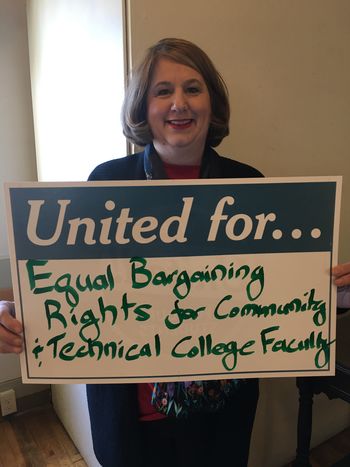 *Please see new information at the end of these guidelines about changes in the law that affect these benefits starting in October 2018.
*Please see new information at the end of these guidelines about changes in the law that affect these benefits starting in October 2018.
If you are a part-time faculty member at any of the community or technical colleges, you may be eligible for unemployment benefits during breaks between quarters or over the summer. This document provides you all you need to know about eligibility criteria and the specific statutes that the union has fought to put in place for you.
New Unemployment Legislation expands liberal interpretation of Reasonable Assurance for continued employment!
Here is an update on legislation that affects part-time faculty members applying for UI benefits. HB 2703 brings some changes to the law we have had in place for many years now. There are some changes which you will want to be aware of, but they do not substantially affect any of the information we have already posted here. In a system where receiving UI benefits is never a guarantee, this bill is still good news.
HB 2703: Employees – Unemployment Benefits – Hours and Wages.
This bill, effective June 7, 2018, modifies the current laws regarding unemployment benefits and reasonable assurance for CC/TC part-time faculty. WEA worked together with ESD as the bill was being drafted and were pleased to see changes that we hope will be very favorable to not only part-time faculty in our CC/TCs but in the four year universities as well. It also expands its reach to K-12 employees where applicable. Here are the main changes that this bill includes:
1.) It expands the very liberal interpretation of Reasonable Assurance that we have worked hard to get into state statute over the past 15 years or so and applies it now to ALL education employees in the state. That includes K-12 as well as four year universities. This is a good thing, in general, because we have always wanted to include the four year university part –time faculty but our law was very narrowly written to only address community and technical colleges. It is also good, because since this will be more broadly applied, it is less likely to cause the confusion that had existed because of being such a specially defined outlier group in ESD rules.
2.) It undoes an old rule that prevented part-timers who work at more than one college from getting benefits if one college won their appeal determining that reasonable assurance did exist. Now, part-timers will receive benefits if it is decided that only one of the colleges they work at does not provide reasonable assurance.
3.) It creates an automatic determination of NO reasonable assurance if an offer of employment is contingent on anything within the employer’s control. The language of the bill reads like this:
“If any contingencies in the employment offer are within the employer's control the claimant will not be considered to have reasonable assurance of employment. Contingencies within the employer's control include, but are not limited to:
(i) Course programming;
(ii) Funding allocation decisions;
(iii) Final course offerings;
(iv) Facility availability.”
This will, however, not prevent colleges from being able to appeal any claims, but they will have to prove that there are absolutely no contingencies or that the contingencies are not within their control.
4.) In addition, there is a very favorable definition of an acceptable offer of employment which reads as follows:
“The economic conditions of the offer of employment may not be considerably less in the following academic year or term (or portion thereof) than in the first academic year or term (or portion thereof). "Considerably less" includes the condition that the individual will not earn at least ninety percent of the wages earned in the prior academic year or term.”
5.) We and AFT Washington have been working very closely with the staff at ESD, to assure that this new law will be as seamless a transition as possible and that our part-time faculty will be just as likely, and even more likely, to be successful in applying for benefits during breaks and between quarters.


 *Please see new information at the end of
*Please see new information at the end of